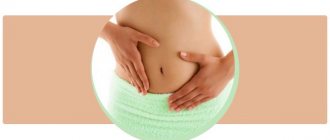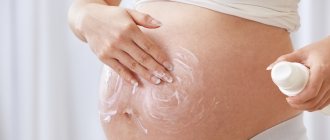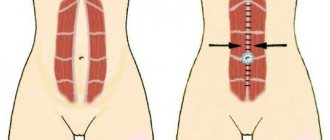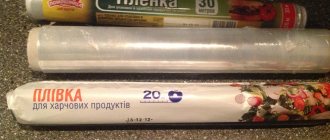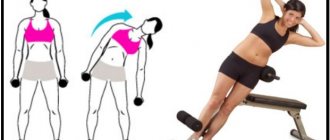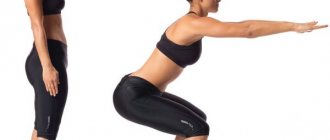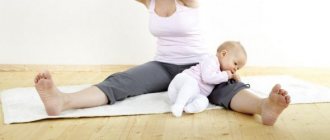Under no circumstances should you...
New mothers, and especially nursing mothers, should never try reduced diets!
Any reductions and prohibitions - be it in terms of calories, fats, proteins or carbohydrates - are not for them. During the postpartum period, a woman must have a balanced diet of all ingredients, including additional vitamin complexes designed for mothers after childbirth.
The best diet to help you lose weight after childbirth is a balanced diet without fasting days, which does not cause any allergic manifestations in the child. And if the baby shows a reaction to some foods on the mother’s menu, she will, in any case, end up on an impromptu diet, refusing them. The postpartum period is a good time to harmonize your eating habits.
In addition, it is important to get enough sleep. Look for an extra opportunity to sleep at any time of the day! Walk more with your child, listen to music that gives positive emotions.
In my experience, in the first months after childbirth, the psycho-emotional state and normal sleep are much more important and beneficial than any diet, which will inevitably turn out to be additional stress for the mother.
If you follow these simple rules, your weight can be restored within the first two months after giving birth. If there are no problems with your daily routine and nutrition, and the weight does not budge, you can be sure: your body still needs these kilograms. Be consistent, don't panic, and you'll definitely get back into shape.
Having set yourself the task of losing weight after childbirth, keep a food diary and do not forget to praise yourself and enjoy motherhood. Any negative emotions interfere with weight normalization - both psychologically and by influencing the formation of unfavorable hormonal levels.
Exercises for weight loss
A small set of exercises performed every other day will give a nursing mother the opportunity to regain her former shape without harming her milk.
| After natural childbirth | After caesarean section |
| Exercises in the first days after childbirth:
Exercises one week after surgery:
Exercises after two months:
|
How to lose weight after childbirth: algorithm of actions
First, take control of all meals: both “full meals” and snacks. Secondly, control the fact of taking liquid, and what kind of liquid it is.
We are talking primarily about pure natural still water. The daily water intake for a woman is 30 ml per 1 kg of existing weight. However, a nursing mother should drink at least 1 liter more. You can also drink tea with milk, various herbal infusions that do not cause allergies in the child. Fluid is very important for weight loss, recovery and normal functioning of the body.
Third, don't let your emotions get the better of you. Fourth, plan an approximate flexible diet and sleep schedule, making up for the lack of rest at night with additional daytime hours - sleep when the child sleeps. Fifth, move your stroller more by developing different walking routes.
Basic rules for performing exercises
In order for the gymnastics performed to bring the desired result, you should follow a few simple rules:
- gradually increase the load;
- diversify exercises for greater effectiveness;
- maintain regularity of exercises;
- exercise in a well-ventilated area;
- movements should be smooth and slow;
- breaks are required;
- before starting a workout, empty your bladder and intestines;
- perform gymnastics after feeding one and a half hours before meals;
- During and after gymnastics, drink plenty of fluids.
Monotony is the enemy of slimness
A woman who wants to lose weight after childbirth must include animal protein in her diet. And if you are prone to iron deficiency anemia, then red meat should be on the menu at least 2-3 times a week.
Non-starchy vegetables and a sufficient amount of greens (in total - at least 500 g per day) ensure good intestinal motility, have a negative calorie content and promote weight loss. Also, leafy vegetables and low-starch vegetables contain sufficient amounts of calcium, vitamins and microelements, which are important for rapid recovery after childbirth.
Fresh fermented milk products are luxurious probiotics! They ensure the formation of a good immune response, which is important for the recovery period when the body is vulnerable.
Cereals and dark wholemeal bread are recommended to be consumed in the first half of the day. They contain many B vitamins, which stimulate carbohydrate and protein metabolism and normalize the nervous system.
Unsweetened fruits or berries (1-2 servings per day) are an excellent source of vitamins, antioxidants and pectins, which also help maintain stable intestinal function. Don't forget about 1 tablespoon of vegetable olive oil added to salads, as well as a small handful of nuts and dried fruits as a snack.
Eating after childbirth should not be monotonous. Let food bring not only satiety, but also pleasure.
Sports and breastfeeding
- You are encouraged to drink plenty of fluids while breastfeeding, but your body loses a lot of moisture during athletic training. How to combine these two contradictions without harming lactation?
- If you feel thirsty while exercising, you need to drink some water. In order not to harm lactation, nursing mothers are advised to drink more often, but in small sips. The amount of liquid drunk at one time should not exceed 100 ml. Timely consumption of water will replenish lost moisture to the body. Read more about this in the article What can a nursing mother drink>>>
Pharmacy supplements - help or harm?
Regarding the use of so-called biologically active food supplements, many of which are positioned as means to help you lose weight after childbirth, I advise you to first consult with your pediatrician.
The fact is that many dietary supplements can cause an allergic reaction in a child, can enhance or inhibit intestinal function (both mother and child), and can overexcite or inhibit the reactions of the nervous system.
As a nutritionist, I do not recommend that breastfeeding mothers take lipolytic or bowel-boosting supplements. When trying to quickly lose weight after childbirth, using them can cause consequences that are undesirable for a young mother, whose time and health mostly belong to the newborn.
Will sports activities affect the quality of breast milk?
- Studies have been conducted that have shown that exercise does not affect the production process, quality and volume of breast milk. What breast milk production depends on is the number of times the baby is latched to the breast. Read the article on this topic: Feeding on demand>>>;
- The level of prolactin and the content of potassium, phosphorus and other useful substances in the milk of women involved in sports are no different in terms of indicators from nursing mothers who do not introduce additional physical activity into their lives.
There is an opinion that lactic acid secreted by the body during sports training penetrates into milk and affects its taste, to the point that the baby becomes unpleasant in its taste, and he may refuse to breastfeed altogether.
During intense physical activity, lactic acid can enter a woman’s breast milk, but in small quantities; it does not affect the taste of the milk in any way; moreover, lactic acid is very quickly eliminated from the body.
Analyzing the literature on breastfeeding, I can say for sure that sports during lactation cannot negatively affect the quality of breast milk, and a newborn’s refusal to breastfeed will not be associated with your training.
Protein postpartum diet
Nutritionists have long concluded that a protein diet gives the most effective results . With a carbohydrate deficiency, the body looks for energy in other places and begins to receive it from the breakdown of fats. But only an absolutely healthy person can follow this diet. And all because it puts a significant strain on the kidneys, requiring a large amount of fluid.
The body becomes deficient in vitamins. And all for the reason that many vitamins can be absorbed only in the presence of fats. A lack of microelements in the body of a woman who is on a diet is caused by limiting carbohydrate foods. But “heavy foods” can lead to disruptions in the functioning of the gastrointestinal tract. With food restrictions, the level of blood clotting increases , which increases the risk of thrombosis.
A young mother needs to balance the health of her baby, especially when breastfeeding, with the desire to return to its previous shape.
Considering all of the above, experts do not recommend using this diet for weight loss after childbirth.
Fast diet
In order to avoid problems with losing weight in the future, you need to get in shape even before the moment of conception . Only in this case, the extra pounds will go away without much difficulty. But if you did not have time to do this, then contact a nutritionist after giving birth. In order to lose excess weight faster, there is a special fast diet. Its basis is fasting days, which contribute to rapid results. These days, only a carbohydrate or protein diet is practiced.
Carbohydrate days:
- 1.5 kilograms of a variety of fruits and vegetables, except bananas and grapes. These foods are best eaten raw, but can also be baked.
- 200 grams of bran and 1 liter of low-fat kefir.
- One kilogram of boiled potatoes (you can mash them) and 0.5 liters of kefir.
- Boil 150 grams of unpolished rice without salt and divide it into three servings. You can add apples to the lunch portion, and pepper and raw carrots to the evening portion.
Protein days:
- Throughout the day you need to eat 0.5 kilograms of cottage cheese and drink 1 liter of low-fat kefir.
- Mix 200 grams of berries and fruits with 400 grams of low-fat cottage cheese. You can use a blender to make an excellent curd and fruit cream from this mass. You can fill everything with 0.5 liters of low-fat kefir.
- Drink 1.5 liters of low-fat or low-fat fermented milk product.
- Boil 0.5 kilograms of fish or lean meat without salt (you can have chicken or turkey without the skin). You can add some greens to them.
- Hard boil two eggs and take 300 grams of hard cheese.
Don't forget about physical activity.
Reasonable rules
It is best to understand from the very beginning that losing weight after childbirth is a fairly long process, and it directly depends on the number of kilograms gained and on the general condition of the body. You can lose 5-10 kg within 2-3 months without much effort, just by switching to proper nutrition. But if excess weight is expressed in double digits, you will have to work on yourself more seriously and longer.
To make the weight loss process more active, you must adhere to the following rules:
- Lose weight with pleasure. You have fulfilled your main purpose - you have given the world a new life. If you perceive postpartum weight loss as a natural part of this process, there will be no room for stress.
- Not to starve. Hunger is extra stress for the body, which neither mother nor child needs, and one of the factors that can further unbalance the hormonal system and provoke additional weight gain.
- Stay outdoors as much as possible. Walking activates metabolism, improves mood, promotes the production of vitamin D (and in the child too!), improves sleep, and saturates the blood with oxygen.
- Be sure to have breakfast. A morning meal starts the digestive system, provides the body with energy and speeds up metabolic processes. If there are no contraindications, a morning cup of coffee will come in handy.
- Limit fats. Fatty and fried foods not only overload the liver, but also clog blood vessels with cholesterol plaques, impairing blood circulation.
- Replace fast carbohydrates with slow ones. Refuse white bread, muffins, pastries, and especially cakes and pastries with cream. These products are immediately stored by the body as fat deposits.
- Add fruits and vegetables. This is not only a valuable source of vitamins and minerals, which are simply necessary for the restoration of the female body after childbirth. They contain a lot of plant fiber, which gives you a feeling of fullness for a long time and cleanses the intestines.
- Milk and dairy products are an excellent source of protein and calcium. They should be consumed daily, but choose ones with a reduced fat content.
- Light dinner. Another common myth that you should not eat after 18 hours should also be forgotten. Dinner is no less important than breakfast. But it should be light and no later than two hours before bedtime.
- Maintain drinking regime. Clean water is especially necessary for weight loss. During this period, the body is actively cleansed of waste and toxins, which are eliminated along with excess fluid.
Just following all the recommendations listed above will contribute to smooth weight loss and overall health of the body.
Nursing workouts
Moderate physical activity will allow you to lose excess weight, but it also negatively affects the regeneration processes of tissues damaged during childbirth. You can start playing sports no earlier than a month and a half after the birth of your child.
Most experts agree that it is better for new mothers to start with yoga or Pilates. These practices have been proven to significantly transform your body over any period of time. In addition, they have no contraindications, which is very important during the feeding period. With the help of Pilates or yoga, you can reduce the stress that inevitably comes with having a baby in your life.
If you want to play sports while breastfeeding, then I would like to give a few recommendations that will help you with this:
The best form of physical activity while breastfeeding is swimming.
If you start going to the gym, then you shouldn’t use weights. This will allow you to avoid the appearance of lactic acid in breast milk, which can significantly change its taste.
Try to avoid classic cardio exercises, such as running or cycling, so as not to lose large amounts of fluid.
Workouts for nursing mothers
The content of the article:
- Rules
- Workout
- Nutrition program
Every woman after the birth of her baby wants to regain her prenatal shape. However, sometimes women continue to gain weight during breastfeeding. If you want to lose weight, then you should approach training for nursing mothers with all responsibility so as not to harm your body. You should remember that the newborn’s body reacts very sensitively to all changes in the composition of mother’s milk.
Results - real terms of your beauty and slimness
Before starting exercises, every woman asks the question: when will the results be visible. If you correctly follow all the above recommendations in nutrition and systematically perform a set of exercises, after a few months your legs will be more elastic, and you will lose from 3 to 5 kilograms of excess weight. It must be said that proper weight loss cannot be quick. Complex diets can backfire and will certainly not bring any benefit to your young body and baby. After half a year of systematic cardio and strength training, you will become the owner of slender and beautiful legs, the envy of everyone around you! Good luck!
0
Diet for weight loss with hemorrhoids
Hemorrhoids are formed due to a large concentration of blood in the veins of the rectum or anus. During pregnancy, they can appear due to increased pressure exerted by the growing uterus, and during childbirth - due to pushing. For hemorrhoids, a postpartum diet is mandatory. It should include foods that loosen stools to avoid constipation.
Healthy foods:
- Bran.
- Vegetable oil (homemade is best).
- Prunes (if you have individual intolerance, you can replace them with dried apricots).
- Buckwheat, pearl barley and wheat porridge.
- Fish and meat products.
Fruits and vegetables:
- Cauliflower.
- Apples.
- Carrots are raw.
- Bananas.
- Broccoli.
Products that are best excluded from the diet:
- Coffee and cocoa.
- Fried foods.
- Peppery and spicy food.
- Carbonated drinks.
- Chocolate.
- Floury and sweet (especially white bread).
- Smoked meats and pickles.
- Legumes.
